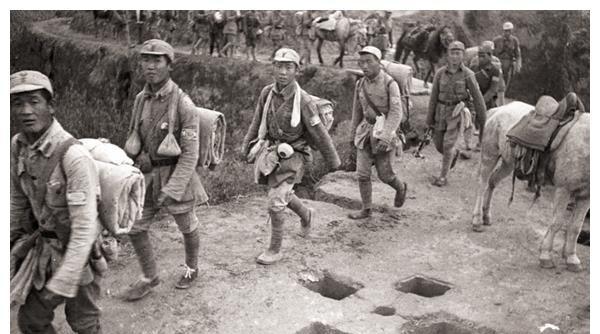In the history of China's modern revolution, the Red Army and the Eighth Route Army, which were in the initial stage of their careers, were extremely short of materials. Many even carried large knives to the battlefield, enriching their ranks by capturing enemy supplies.
In addition, it is to get supplies by dividing up the fields by playing local tycoons. Of course, in addition to adopting such a drastic approach, in the face of enlightened landlords and progressive gentlemen, they adopted the method of keeping IOUs to ensure their supplies.

After the founding of New China, our army and the armed forces of other quarters began to pay off their debts, and repeatedly arranged for personnel from the Finance Bureau and the Civil Affairs Bureau to look for the "creditors" of that year, and many debts were properly handled in the 1950s and 1960s.
However, there are also some debts that have not been paid in time for various reasons, and such a situation still exists even now. Under normal circumstances, as long as it is verified and there is a real thing, it will be compensated according to the market price. These moves by the government have also won unanimous praise.
In the 1980s, an old farmer named Guo Jianying in Shanxi took an IOU and approached the local government, hoping that the government would honor the IOU in his hand. After receiving this IOU and the old farmer's request, the relevant personnel quickly reported it to their superior organs.
Soon, the higher-level organs arranged for experts to come and verify it, and after a detailed examination, it was clear that this IOU was true and valid and was left by our army during the War of Resistance.
However, after confirming, the experts asked: "Dare to ask the ancestors who they are?" ”
Guo Jianying faced the experts' questions, talked about it, and recounted his story again.
In 1941 and 1942, due to the change in the Kuomintang's anti-Japanese stance, the Eighth Route Army and the guerrillas under its leadership were economically blockaded. At the same time, the Japanese and Kosovars stepped up their sweeping and encirclement and suppression of the base areas against Japan, resulting in unprecedented difficulties in the battlefield behind enemy lines.
In order to cope with this situation, the Eighth Route Army, on the one hand, launched a large-scale production movement, and on the other hand had to borrow money and grain from some wealthy peasant households and enlightened landlords and gentlemen to survive.
And this IOU in Guo Jianying's hand is a good proof.
Due to the current difficulties in Guo Jianying's family, he had to come up with this IOU of about 11 million French dollars, and finally after accounting, Guo Jianying obtained a huge amount of more than 80,000 yuan.
You know, in the eighties, 80,000 pieces could buy a lot of things. You can look at the price level in the eighties, when ordinary cabbage only needed a few cents a pound, pork a pound more than a pound, when the workers' monthly wages were only thirty or forty yuan.
Therefore, when Guo Jianying got this "huge amount of money", his heart did not mention how happy he was, which was also his ancestors' accumulation of virtue, saving such a large amount of money for himself, so that he could have channels to solve it when he encountered difficulties, and it also showed that our government, in the face of the old debts owed during the revolutionary period, never had any intention of default, as long as it was true and effective, it would definitely be honored according to the agreement.
In addition to the IOU that the owner of the IOU like Guo Jianying came to the door to cash in, our government will occasionally find some documents left over from the revolutionary period in its work, and will find ways to find the descendants of those who borrowed money and borrowed money in that year, and take the initiative to fulfill the promises of that year.
For example, in 1941, the 358th Brigade of the Eighth Route Army once borrowed a hundred catties of grain from the family of a farmer named Zhou Moldan and left an IOU. Zhou Modan had already burned the IOU before his death. When government officials were conducting a census of revolutionary sites, they found a register that clearly recorded how much grain had been borrowed from which house, horses had been borrowed, and so on.
When the staff found these notes, they carefully compared the meanings, and found the descendants of these people, and returned everything they owed in that year.
Although Zhou Modan only lent the Eighth Route Army 100 catties of grain and burned the relevant IOUs.
But government officials still found Zhou Moldan's descendant, the Zhou brothers, and delivered three bags of flour, two bags of rice, a barrel of oil, and more than 2,000 pieces of cash to the Zhou brothers.
The Zhou brothers were very excited in the face of this "windfall", saying that they did not expect that the grain lent out more than seventy years ago could be returned on their own initiative, and the value was far greater than that year.
"Don't forget the people who dig wells." Doing a good job in mass work, not infringing on the interests of the masses of the people, and not taking a needle and a thread from the masses has always been the creed of our party and our army, and this creed has been well implemented and implemented in both the revolutionary years and the period of peaceful construction.